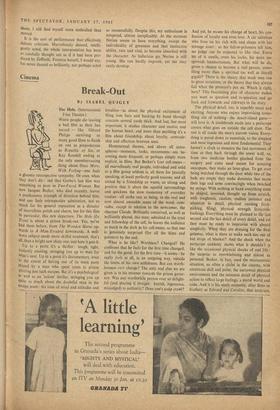Cinema
Break-Out
By ISABEL QU1GLY The Hole. (International Film Theatre.) WHEN people die leaving a bad film as their last record — like Gerard Philipe surviving so many good films to finish on one as preposterous as Republic of Sin, or Kay Kendall ending as the only unembarrassing thing about Once More, With Feeling—one feels a gloomy retrospective sympathy. Or even when they don't die: sad that Garbo's last film was something as poor as Two-Faced Woman. But now Jacques Becker, who died recently, leaves a posthumous triumph of direction behind him, and one feels retrospectyve admiration, not so much for his general reputation as a director of marvellous polish and charm, but for this film in particular, this new departure. The Hole (Le Trou) is about a prison break-out. Yes, we've had them before, from The Wooden Horse up- wards to A Man. Escaped downwards. A well- worn subject needs more skilful treatment, that's all, than a bright new shiny one; and here it gets it.
Up to a point it's a thriller: tough, tight, violently exciting, stringing you up to wait for what's next. Up to a point it's documentary, even to the extent of having one of its main parts Played by a man who spent years in prison Plotting just such escapes. But it's a psychological as well as an 'action' thriller, stringing you up quite as much about the doubtful man in the escape team his state of mind and attitudes and loyalties—as about the physical excitement of filing iron bars and hacking by hand through concrete several yards thick. And last, but most important, it studies character and motive and the human heart, and more than anything it's a film about friendship, about loyalty, comrade- ship and affection between men.
Homosexual themes, and above all atmo- spheres—moments, looks, movements—are be- coming more frequent, or perhaps simply more explicit, in films. But Becker's four cell-mates- all marvellously real' people, individual and solid as a film group seldom is, all there for (socially speaking, at least) perfectly good reasons, and all united by a friendship so warm, so strong and positive that it alters the squalid surroundings and quickens the slow monotony of everyday routine—all strike one as being, in the real and now almost unusable sense of the word, com- rades; except in relation to the newcomer, the charmer Claude. Brilliantly conceived, as well as brilliantly played, this man; admitted to the trust and fellowship of the cell, he leaves the audience as much in the dark as his cell-mates, so that one is genuinely surprised (for all the hints and pointers) by the end.
What is he like? Worthless? Changed? He confesses that he feels- for the first time changed, and for the good; for the first time—it seems—he really feels at all, in an outgoing way, outside the limits of his own selfishness. But can worth- lessness ever change? The only real clue we are given is in his manner towards the prison gover- nor. Was any worthwhile person ever so delight- ful (and playing it straight: boyish, ingenuous, misjudged) to authority? Does one's scalp crawl? And yet, he means his change of heart, his con- fession of loyalty and even love. A car salesman who lives on his rich wife and sleeps with her teenage sister: as his fellow-prisoners tell him, no judge can be expected to like that. Every bit of it smells, even his looks, his quiet un- spivvish handsomeness. But what will he do, given a chance to become a real person, some- thing more than a spiritual (as well as literal) gigolo? There is the theory that weak men rise to great occasions; or the theory that they always fail when the pressure's put on. Which is right, here? This fascinating play of character makes you want to question and re-question and go back and forwards and sideways in the story.
The physical detail, too, is superbly exact and exciting. Anyone who enjoys improvising some- thing out of nothing—the desert-island game— will love it. A toothbrush made into a periscope covers what goes on outside the cell door. The rest is all inside the men's narrow vision. Every- thing is pared down to essentials, to the simplest and most ingenious and most fundamental. They haven't a clock to, measure the fast movement of time as they hack through the sewer wall, so, from two medicine bottles pinched from the surgery and some sand meant for scouring saucepans, they make an hour-glass. To get over being watched through the door while two of the beds are empty they make dummies that move their legs and arms convincingly when twitched by strings. With nothing at hand everything must be shaped, invented, thought up from scratch, with toughness, caution, endless patience and attention to detail, physical cunning (lock- picking, filing), physical strength (concrete- bashing). Everything must be planned to the last second and the last detail of every detail, and yet they must be ready to improvise with absurd simplicity. When they are dressing fot the final getaway, what is there to make neck-ties out of but strips of blanket? And the shock when the periscope suddenly shows what it shouldn't is like the occasional physical shocks of real life: the surprise as overwhelming and almost as personal. Becker, in fact, used the microcosmic situation, so often a cliche in the cinema, with enormous skill and point; the narrowest physical environment and the minutest detail of physical action to reflect large feelings, a moral world and code. And it is his steely economy, after films as feathery as Edward and Caroline. that surprises.










































 Previous page
Previous page